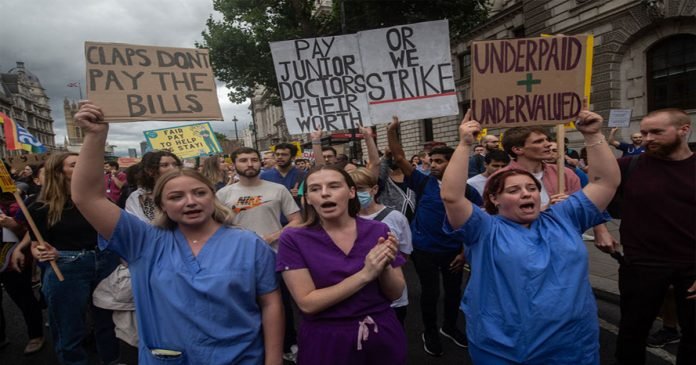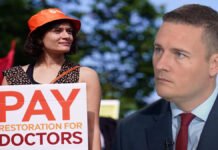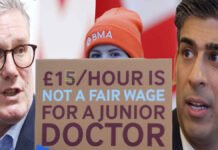Junior doctors in England will go on strike for 72 hours in March in protest about pay if their forthcoming ballot produces a majority for industrial action.
The BMA has today told the Government that, If a ballot for industrial action is successful, junior doctors in England will begin their action with a 72-hour full walkout in March.
The BMA is still urging the Secretary of State for Health to meet with doctors and negotiate a solution to avoid the need for industrial action. But Steve Barclay is the first Health Secretary for over 50 years to continue to ignore all invitations from the BMA to meet with doctors, making attempts to find a negotiated settlement virtually impossible.
Their union, the British Medical Association (BMA), issued the warning as it claimed that junior doctors had suffered a “staggering and unjustifiable” 26.1% cut in their income since 2008.
The BMA statement goes on to say: “Successive governments have overseen fifteen years of real terms pay cuts for junior doctors in England, which amounts to a staggering and unjustifiable 26.1% decline in pay since 2008/09. The BMA has repeatedly called on the Government to reverse these pay cuts, to keep doctors in the NHS and alleviate the staffing crisis which is preventing the NHS from tackling record waiting lists and giving patients the care they need.”
The union will start balloting more than 45,000 junior doctors from Monday in a move that could lead to an escalation of the mounting wave of walkouts by NHS staff over their salaries.
Nurses are set to stage their third stoppage on 18 and 19 January while ambulance staff are due to refuse to work for a second and third time on 11 and 23 January.
The BMA made clear that if junior doctors do vote to strike, which looks likely, they will withdraw their labour from all NHS services, including emergency care, for three days. The ballot will run for six weeks until 20 February.
Strike is now our only option
Patients are suffering and exhausted staff are burning out and leaving the NHS and yet this Government fails to see the crisis in front of it, ignoring all the evidence to the contrary and preferring to treat the public as fools with assurances that the NHS has all the resources it needs. Ministers have ignored all requests to meet and discuss doctors’ pay with the BMA. With the Government’s door firmly shut to dialogue, let alone negotiations, the Association says there is no other option left than to ballot junior doctors in England for strike action.
The BMA said: “Our real terms pay cut comes at a time when our workload is increasing, along with burnout, and so the demand for our services has never been higher.
After working tirelessly through the pandemic with only valueless claps for thanks, it’s no surprise morale has plummeted.
We have tried to remedy this. We have exhausted our goodwill. But we’ve been left with no choice. The Government has continued to ignore our concerns. So industrial action is our only option.
Dr Vivek Trivedi and Dr Robert Laurenson, co-chairs of the BMA junior doctors committee, said:
“The Prime Minister says his door and that of the Health Secretary, are ‘always open.’ But after more than a decade of pay cuts no offer to restore our pay has been made, and all our calls to meet, and letters to the Health Secretary and his immediate predecessors, have been ignored. When we are faced with such resolute ongoing silence, and there is no agreed settlement on the table, then we are left with no choice but to act.
“Junior doctors are not worth a quarter less than they were fifteen years ago nor do they deserve to be valued so little by their own Government. Pay erosion, exhaustion and despair are forcing junior doctors out of the NHS, pushing waiting lists even higher as patients suffer needlessly. The Government’s refusal to address fifteen years of pay erosion has given junior doctors no choice but to ballot for industrial action. If the Government won’t fight for our health service, then we will.
“It is particularly galling for junior doctors to see the government repeatedly justify huge real terms pay cuts for NHS staff by claiming that these have been made by so-called ‘independent’ pay review bodies, free from government interference. The reality is that the doctors’ pay review body has been constrained by political interference for more than a decade. Even after recommendations have been made to increase junior doctors’ pay, the Government has completely ignored them and has asked the pay review body to completely exclude junior doctors from its recommendations.2 When even the pay review process – broken as it is – is telling ministers to act, you know something has gone seriously wrong.”
Support Independent Journalism Today
Our unwavering dedication is to provide you with unbiased news, diverse perspectives, and insightful opinions. We're on a mission to ensure that those in positions of power are held accountable for their actions, but we can't do it alone. Labour Heartlands is primarily funded by me, Paul Knaggs, and by the generous contributions of readers like you. Your donations keep us going and help us uphold the principles of independent journalism. Join us in our quest for truth, transparency, and accountability – donate today and be a part of our mission!
Like everyone else, we're facing challenges, and we need your help to stay online and continue providing crucial journalism. Every contribution, no matter how small, goes a long way in helping us thrive. By becoming one of our donors, you become a vital part of our mission to uncover the truth and uphold the values of democracy.
While we maintain our independence from political affiliations, we stand united against corruption, injustice, and the erosion of free speech, truth, and democracy. We believe in the power of accurate information in a democracy, and we consider facts non-negotiable.
Your support, no matter the amount, can make a significant impact. Together, we can make a difference and continue our journey toward a more informed and just society.
Thank you for supporting Labour Heartlands












